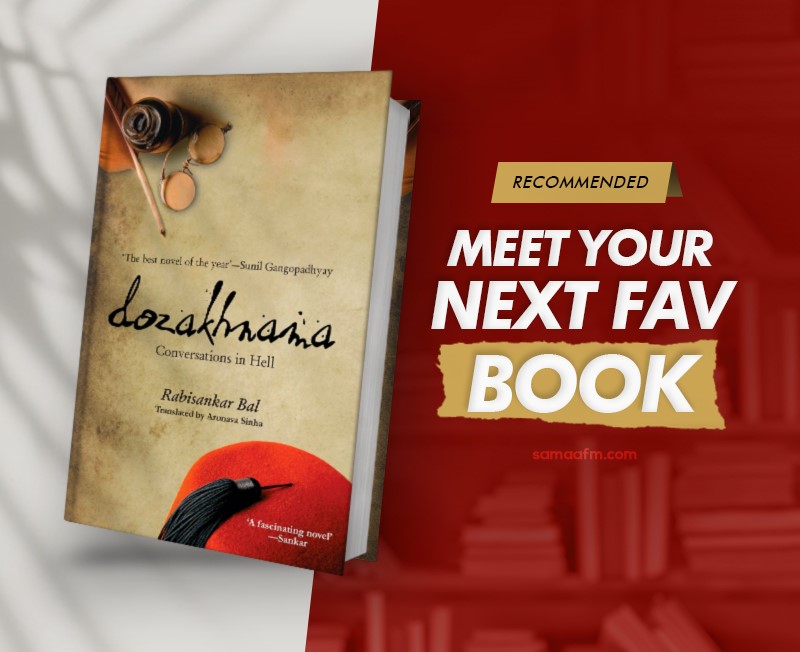
Book Review: Dozakhnama by Rabisankar Bal
- posted by: Abdul Latif Dadabhouy
- No Comments
Dozakhnama – Review
Dozakhnama by Rabisankar Bal is an extraordinary novel, a biography of Manto and Ghalib; chaotic life of artists, the trauma of partition, British supremacy, and a history of Indian culture rolled into one. The writer has skillfully knitted a plot of the story-conversation between Manto and Ghalib from hell presents a lucid image of surrealism- the term is artistically applied in the novel. The dialogues of the major characters give a complete sense of realistic pieces imbibed in a fictional way.
The conversation of Ghalib
Dozakhnama must have to play a vital role for researchers who can take it as a comparative study of Mir and Ghalib. The conversation of Ghalib begins with a poetic lines of Mir. Undoubtedly, Ghalib was highly inspired from Mir therefore, he articulated;
“ریختہ کے تم ہی استاد نہیں ہو غالب
کہتے ہیں اگلے زمانے میں کوئی میر بھی تھا”
Furthermore, Ghalib was an iconoclast, because he changed the dynamics of poetry. He was not like the previous century poets who seemed busy to chase beloved and composed poetry on moon or soulless creations for such poets Plato rightly said “Poets should be banished from ideal state.” Therefore, the writer said;
“When the Momin’s and Zauq’s were either repeating themselves and nauseam about moon and flowers and birds and ladies, or composing encomiums to the emperor, Mirza Sahib arrived on the scene to breath new life into the dead ghazal.”
Additionally, the way Ghalib taunts and criticizes court poets motivates an artist to be a non-conformist. He said;
“While you dance to the tune of the court, poetry is deserting you and you are not even aware of it.” Or “Politics and poetry belong to two different worlds. If you want victory in one of them, you have no choice but to face defeat in the other. I could not score a victory in the world of politics.”
The tragic life of Saddat Hassan Manto
Moreover, the tragic life of renowned short story writer Saddat Hassan Manto reminds that those who face multifarious challenges in their lives will be remembered till centuries. Manto’s Platonic love for Ismat makes story more interesting. Manto sadly narrates the trauma of partition as though the sky has fallen upon his happy family. He utters prophetic words;
“This was not just the Partition of India, not just Hindustan ki taksim, this was also a partition of friendship.”
Post colonial literature
In a way, Dozakhnama plays an important role in post-colonial literature; the last 10 chapters of the book must have to be included in the course of English literature. A number of sentences will develop the critical and analytical thinking of students. They can gauge from the fact that Whites did not only intend to colonize ordinary people while leaders have also become puppets in their hands. Manto said;
“We had become puppets in the hands of the Nehru, and Jinnah and Patel. Such hatred, such distrust all around. These leaders were all leeches, my brothers, they deserved to be exterminated in boiling water. They had no other mission besides sucking our blood.”
A number of sentences reflect barbarity of Whites or British imperialism in the novel. For instance, Ghalib said to Manto
“There is no limit to man’s cruelty, Manto bhai. For the first time, I realized that the English were just as barbaric. Who knows, maybe the history of civilization is nothing but the history of barbarity from another perspective.”
Ghalib was an eye witness of the terrorizing attitude of Whites, he said;
“The same British who had once seemed harbingers of a new civilization now revealed their teeth and claws to me.”
The contrasts of colonialism, communism and imperialism
Besides, the writer has beautifully painted a picture of imperialism by saying
“I met many people in Dilli, in Calcutta, who never read any of Hindustan’s own books. White men’s works were the last word for them.”
Not only colonialism seems under criticism but Communism is also ironically demonstrated;
“Who gave you the responsibilty of making everyone equal? Only Sufi dedication can achieve that. This is the path of the fakir and the dervish, there’s no room here for communism.”
“Commitment to equality for all is not for those whose objective is to seize power.”
“The game of “them” and “us” is a very interesting one . The communists are experts at it.”
Read More: Book Review: The Hundred Years’ War on Palestine by Rashid Khalidi
Conclusion
Amidst all, Dozakhnama is the finest example of mysticism as well. The folk tales Mirza Ghalib used to narrate to his disciple Kallu brought up a whirl of Rumi. So, the novelist’s ultimate purpose is to preserve cultures, rituals, and literature of the subcontinent by writing a story, not a history. Because he opined “History turns to dust, Manto Bhai, stories live on.”
(Book Reviewed By Meer Mansoor)
Want to review a book? Contact us




